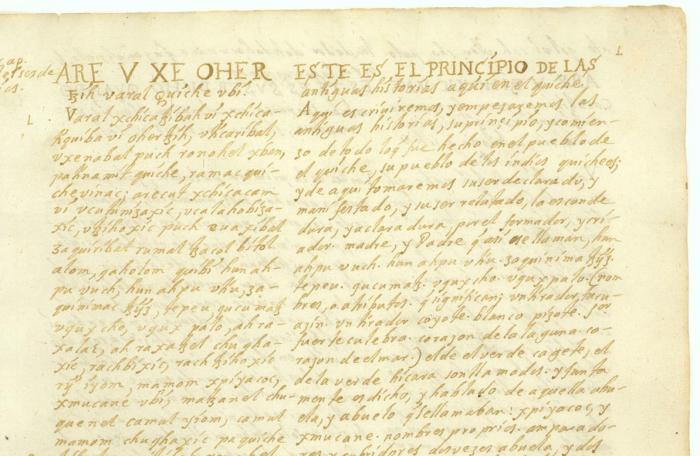Multepal Project Featured in Oxford Research Encyclopedias; Foundations Were Built in DH Classroom

Facsimile of the Popol Vuj, Folio 1, recto.
Courtesy of the Newberry Library and
the Ohio State University Libraries.
Multepal Project Featured in Oxford Research Encyclopedias; Foundations Were Built in DH Classroom
Multepal, an online thematic research collection on Mesoamerican culture, is now featured in the Oxford Research Encyclopedia of Latin American History. The DH project is the subject of an OER article, “Digital Resources: Multepal, Mesoamerican Studies, and the Popol Wuj,” authored by UVA School of Data Science Program Director Rafael Alvarado and Allison Bigelow, the Tom Scully Discovery Chair Associate Professor of Spanish at the University of Virginia. Multepal originated in a 2017 DH course co-taught by Bigelow and Alvarado.
Multepal pulls together primary and secondary sources in support of teaching and research on Mesoamerican topics. Per its OER entry, the Multepal edition of the Popol Wuj assembles "page facsimiles, marked-up textual transcriptions (using TEI), scholarly annotations, and a linked network of characters, places, technologies, and other topics referenced in the story," providing users with deep and rich context for one of the most signifcant Indigenous texts in the Americas recounting the mythology and history of the K'iche' people. The Oxford Research Encyclopedias are a subscription-based initiative from Oxford University Press, offering peer-reviewed articles and scholarly summaries across 25 disciplines including Anthropology and Latin American History.
Multepal arose from a spring 2017 DH course called “Latin American Digital Humanities,” co-taught by Bigelow and Alvarado. Graduate and advanced undergraduate students performed much of the initial annotation and text-encoding correction work for Multepal's Popol Wuj. Alvarado led the information architecture for Multepal, including text encoding using the TEI schema, as well as the development of a database to store and link topic information. Bigelow led the interpretive portion of the seminar, as well as the student-performed close-reading and annotation of the text and the database. They currently co-direct Multepal.
The present focus of Multepal is a digital critical edition of the Popol Wuj, sometimes referred to as the K’iche’ Maya book of creation. Since the end of the course in May 2017, Alvarado and Bigelow have produced an online version of the text that presents a paragraph-centric, interactive, readable way to explore the Popol Wuj. Undergraduates and graduate students continue to add to the project. Spanish PhD student Catherine Addington has marked up and translated the Dominican priest Francisco Ximénez’s 18th century annotations of the Popol Wuj in fulfillment of the UVA DH Certificate program’s practicum requirements. (She received the DH Certificate in May 2020.) Of her work on the Multepal project, Addington says that "the Popol Wuj manuscript, as a product of a colonial encounter between Indigenous thinkers, European missionaries, and generations of archivists, translators, and editors, taught me to value multiplicity and tension in my sources. Working with this manuscript, in both our seminar and my continued work on the Multepal project, directly inspired my current commitment to translation and editorial work and taught me to value these fields’ scholarly contributions." Additionally, computer science and linguistics student Aldo Barriente, CLAS ‘22, is finalizing his Canonical Text Service (CTS) edition of the Popol Wuj which will form the basis of Multepal’s contribution to Open Maya, one third of the Open Philology Project. Other UVA graduate student contributors to the project include: Karina Baptista, Nicole Bonino, María Esparza Rodríguez, Matthew Richey, Benjamín Romero Salado, Michelet Maclean Estrada, Dave Prine, Rachel Gardella, and Will Norton.
Bigelow notes that Yukatek linguist Miguel Óscar Chan Dzul at la Universidad de Oriente (Valladolid, Yucatán) recently joined the Multepal team, and plans a meeting with experts on Maya philosophy, Tz'utujil language, and highland Maya history and culture. “The next stages of the Multepal project will be driven by the needs and interests of Maya collaborators -- scholars, students, and community members,” Bigelow said. Users of the site are requested to "recognize the data sovereignty of the K'iche' people and the contributions of Indigenous women and men, present and past, to these kinds of scholarly research projects," and to "use the wisdom and knowledges contained within these pages in ways that respect the art, history, and culture of the K'iche' people."
The project enjoys support from a number of sources including the Duke-UVa-Vanderbilt Partnership for Less Commonly Taught Languages, along with a course development grant from UVA’s Americas Center/Centro de las Américas, which funded web support and the purchase of Allen Christenson’s “Popol Vuh: The Sacred Book of the Maya: The Great Classic of Central American Spirituality, Translated from the Original Maya Text.” Observing decolonial scholarly practices, the Multepal team worked with Newberry Library archivists John Powell, Will Hansen, and Analú López to obtain permission to work on facsimiles of the Popol Wuj manuscript blessed by elders from the Chichicastenango community in 2011.
Since the 2017 course, much of Bigelow's work has focused on the intersection of digital humanities and colonial literatures, science, and technology. With McIntire Department of Art Professor Douglas Fordham, she co-organized the April 2019 conference "Decolonizing the Digital Humanities," which brought together DH practitioners, scholars, and artists from Australia, Latin America, and the US to explore and push the boundaries of digital decolonization in the context of Indigenous artwork, histories, and literatures.
Alvarado is a career digital humanist who trained as an anthropologist with a specialization in the epigraphy and iconography of the classic lowland Maya. He has published and taught in the digital humanities, data science, and media studies with a focus on cultural analytics. He has written code for a number of digital humanities projects including the Princeton Charrette Project, Dickinson's House Divided, and UVA's Digital Yoknapatawpha.
